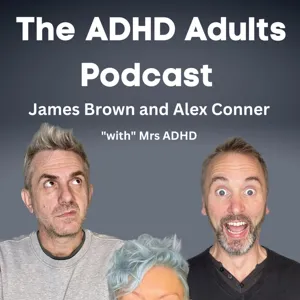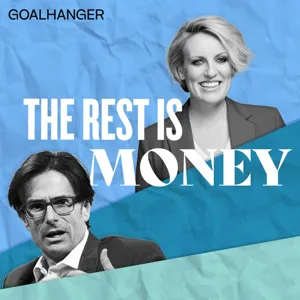Podcast Summary
The 1918 flu pandemic's unexpected emergence and rapid spread: The 1918 flu pandemic, similar to COVID-19, was a global event that spread quickly due to a mutated virus, underscoring the importance of learning from history and taking preventative measures.
The 1918 influenza pandemic, much like the current COVID-19 crisis, was a massive global event that caught people off guard due to the virus's ability to mutate into a new, unprepared-for strain. The pandemic, which infected an estimated 500 million people worldwide and killed between 50 and 100 million, first emerged in the United States at army camps, including Camp Funston in Kansas. The virus then spread rapidly through soldiers and civilians alike, reaching Europe and the battlefields of World War I, where conditions were ideal for its spread. Historian Nancy Bristow emphasizes the importance of learning from the past, as both pandemics demonstrate the devastating consequences of underestimating the potential impact of a mutated virus and the importance of taking preventative measures.
The 1918 influenza pandemic was devastating due to large military populations and mutated virus: The 1918 influenza pandemic was 25 times deadlier than regular seasonal flu, with 675,000 deaths in the US, primarily affecting soldiers and young adults
The 1918 influenza pandemic, which started at Camp Funston in the United States, was particularly devastating due to the large population of soldiers with compromised health, living in close quarters during World War I. The virus mutated and became more deadly in Europe, and when it returned to the US, it was highly contagious and deadly, with approximately 28% of Americans getting sickened and 675,000 deaths, making it 25 times as lethal as regular seasonal influenza. The second wave of the epidemic ran through the fall of 1918 and was devastating. Almost horrifically, a third wave struck early in 1919, just as communities were beginning to recover, with almost 50% of epidemic deaths being 20 to 40-year-olds, who were the backbone of society. The war likely played a role in the virus's mutation and the prime age population being its primary victims.
The 1918 influenza pandemic was quickly forgotten due to World War I: The 1918 influenza pandemic, which led to millions of deaths, was overshadowed by World War I and faded from public consciousness, leaving behind a powerful account in Catherine Porter's novella 'Pale Horse, Pale Rider'.
The 1918 influenza pandemic, despite its devastating impact, was quickly forgotten in the public consciousness. This is likely due to the fact that it occurred during World War I and the war was a more compelling narrative for the American people. The pandemic, which led to the deaths of millions, was also a reminder of the lack of control people had over their health and the vulnerability of even the most powerful nations. One of the best accounts of the pandemic comes from Catherine Porter's novella "Pale Horse, Pale Rider," which provides a firsthand account of the illness and the emotional toll it took on those who survived. The novella, written from the perspective of a patient, offers a vivid and moving portrayal of the experience of being sick during the pandemic, including the fear, pain, and loss.
Lessons from the 1918 influenza pandemic: During crises, clear and accurate communication from leaders is crucial. The 1918 influenza pandemic shows that prioritizing the war effort over sharing health info can lead to misconceptions and lack of compliance, causing unnecessary suffering.
During times of crisis, such as pandemics, clear and accurate communication from leaders is essential. However, during the 1918 influenza pandemic, many governments, including the United States, prioritized the war effort over sharing information about the virus, leading to misconceptions and a lack of compliance with public health measures. This pattern is not unique to the 1918 pandemic, as it has been observed during the coronavirus pandemic in 2020. The blues music of the time, as described in the discussion, reflects the fear and confusion people experienced during the pandemic, and songs like "1919 Influenza Blues" and "Jesus is coming soon" express the belief that the suffering was part of a divine plan. Overall, the history of the 1918 influenza pandemic provides valuable insights into human behavior during crises and the importance of effective communication from leaders.
Robust public health systems and trust in institutions save lives during a pandemic: Trusting public health leaders and their guidelines, even during temporary inconvenience, can lead to lower death rates during a pandemic
During a pandemic, following public health guidelines, such as social distancing, can save lives even if people continue to get sick and die. However, it's understandable for people to feel frustrated and anxious to return to normal life, especially when it's inconvenient. Historical examples, like the 1918 flu pandemic in Philadelphia and Milwaukee, show that cities with robust public health systems and strong public trust in institutions were more successful in implementing and maintaining restrictions, leading to lower death rates. Therefore, it's crucial to trust the science and expertise of public health leaders during a crisis, even if it means temporary inconvenience and hardship.
Understanding the challenges faced by policymakers during public health crises: Public health crises present significant social and economic consequences, making it difficult for policymakers to make the right decisions. Changing behaviors, even for safety, is a challenge, and understanding the context and challenges faced by both policymakers and the public is crucial.
During public health crises, it's challenging for policymakers to make the right decisions due to the potential for significant social and economic consequences. For instance, during the 1918 flu pandemic, some people in Roanoke, Virginia, disregarded quarantines despite still being contagious, putting others at risk. However, we must remember that policymakers in 1918 didn't have the benefit of hindsight and were doing their best in an uncertain situation. Additionally, getting people to change their behaviors, even for their own safety, is a difficult task. The notion of germ theory was still new to many people, making it hard for them to adopt new habits like handwashing or not sharing drinking cups. Even figures like Amelia Earhart wrote about their experiences during the pandemic, revealing gendered reactions to the crisis. Ultimately, the pandemic underscores the complexity of public health crises and the importance of understanding the context and challenges faced by policymakers and the public alike.
Gender Roles and Societal Norms During the 1918 Influenza Pandemic: The 1918 influenza pandemic highlighted gender roles and societal norms, with women expressing fear and vulnerability, men worrying about work, and societal beliefs influencing family dynamics. Volunteers during the pandemic perpetuated stereotypes and blame.
The 1918 influenza pandemic, like the current coronavirus crisis, brought out deeply ingrained gender roles and societal norms. Women, during the pandemic, expressed fear and vulnerability through detailed letters about their loved ones' health. Meanwhile, men worried about work and maintaining traditional gender roles. Gender played a significant role in shaping individual experiences, as seen in the story of Lillian Kansianich, who was traded between family members due to societal beliefs about men raising daughters. Furthermore, volunteers during the pandemic, such as those from the Red Cross, often looked down on those affected by the virus, perpetuating stereotypes and blame. These historical parallels remind us that viruses are not just biological entities but also social organisms, exposing societal fissures and fault lines.
Class divisions and crisis response: During crises, class distinctions and perceptions of worthiness influence aid and donations. Empathetic volunteers who recognize differences as circumstantial can facilitate better health outcomes.
During times of crisis, class divisions and attitudes can significantly impact the way people help and perceive those in need. Volunteers with compassionate and empathetic approaches, recognizing differences as a result of circumstance rather than innate human lacking, had the most opportunity to facilitate good health and aid in moving people forward. However, class distinctions and perceptions of worthiness influenced charitable donations and willingness to extend a helping hand. Those who didn't conform to American traditions or appeared different were often categorized as the "other" and received less care. The present-day coronavirus pandemic highlights this issue, as those with stable jobs and resources face fewer consequences compared to hourly workers, gig economy workers, or those without health insurance. Mortality rates also vary greatly depending on wealth, access to healthcare, and geographic location. Understanding these class dynamics and their impact on crisis response is crucial for creating effective and equitable aid programs.
COVID-19 pandemic highlights and exacerbates health disparities: Despite the pandemic's impact on all communities, beliefs and biases often reinforce existing disparities, requiring awareness and equitable solutions
The COVID-19 pandemic has highlighted and exacerbated health disparities based on social position, economic status, and racial hierarchy. This inequitable access to healthcare mirrors historical patterns, such as the segregated healthcare system during the 1918 flu pandemic. Despite the pandemic's impact on all communities, people's beliefs and biases often remained unchanged, leading them to use the crisis to reinforce their existing viewpoints. For example, some advocated for social justice, while others expressed class prejudice or xenophobia. Understanding this pattern can help us be more aware of our own biases and work towards equitable solutions.
Recognizing global citizenship during the pandemic: Historian Nancy Bristow emphasizes the importance of acknowledging disparities between those who can work from home and those who cannot during the pandemic, and working towards effective solutions as a global community.
The coronavirus pandemic highlights the disparities in our society, particularly between those who can work from home and those who cannot. Historian Nancy Bristow, speaking from the University of Puget Sound in Washington state, which has been heavily impacted by the outbreak, emphasizes the importance of recognizing ourselves as global citizens and being sensitive to the cultural differences and challenges faced by those in precarious financial situations. The pandemic has forced many to practice social distancing, but for essential workers and those in service industries, this is not an option. The privileged, who can work remotely and continue to earn a living, are safer, while those in more vulnerable financial contexts face the greatest danger. It's crucial to acknowledge these disparities and work towards finding effective solutions together as a global community.






